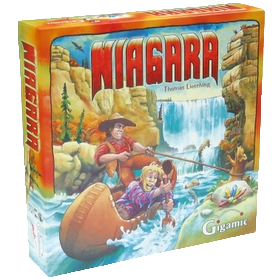Niagara
 Niagara is a game designed by Thomas Liesching and published by Zoch Verlag.
Niagara is a game designed by Thomas Liesching and published by Zoch Verlag.
Number of players: 3 - 5
Game duration: 31 mn
Complexity: 2 / 5
Play Niagara and 1229 other games online.
No download necessary - play directly from your web browser.
With your friends and thousands of players from the whole world.
Free.

Play Niagara and 1229 other games online.
No download necessary - play directly from your web browser.
With your friends and thousands of players from the whole world.
Free.

Rules summary
For tips on how to play niagara, see Tips_niagara
Objective
- Players paddle canoes along the Niagara river to collect gems of five different colours and bring them safely back to shore without being swept over the waterfall.
Game end
- To win, a player must return either:
- 5 different coloured gems (1 of each)
- 4 gems of the same colour
- 7 gems of any colour
Tie break
- The value of the gems.
- The gems closer to the waterfall have a higher value. In order the gems are:
| Gem | Colour | Value |
|---|---|---|
| Amethyst | Violet | 1 |
| Diamond | Clear | 2 |
| Amber | Yellow | 3 |
| Sapphire | Blue | 4 |
| Ruby | Pink | 5 |
Cards
- Players have a set of 7 paddle cards which they play to determine the speed of their canoes and the speed of the river.
- All players must select the card they will play before the players then move their canoes in turn order.
- Once a card has been played it is not available to play again until all 7 cards have been played.
River movement
- After all the players have moved their canoes the river moves causing all the canoes on the river to be swept downstream.
- The river moves the same number of places as the lowest value paddle card played plus or minus a modifier depending on the weather.
- At the beginning of the game the weather is set to 0 so there is no modification but each player also has a cloud card as part of their set of paddle cards that allows them to adjust the weather and hence make the river speed up or slow down.
Canoe movement
- The number on the paddle card determines the number of spaces that the canoe moves - it costs 2 paddle points to pick up (or offload) a gem.
- Thus if a player chose their 5 card they could move their canoe 5 spaces *or* they could move their canoe 3 spaces and pick up a gem
- Or they could offload a gem and move their canoe 3 spaces.
- Both canoes may be moved with the same paddle card
- Both canoes are moved the same amount, the paddles points are not split between the canoes.
- When both canoes are out of the water only one can be launched in that turn.
- If both canoes are in the water they must both be moved using the full value of the paddle points - a player cannot chose not to move one canoe and must always use the full value of the paddle points.
- However if one of the canoes is out of the water a player may choose not to launch it.
- Canoes may only move upstream or downstream in a single turn - it is not permitted to change direction in the middle of the turn.
- However one canoe could move upstream and the second one downstream.
Stealing
- Players may steal gems from other canoes, but only after moving upstream and only if they finish on the same space as the other player.
- And only if they have an empty canoe and hence space to load the gem.
- Turn order is therefore crucial for stealing.

